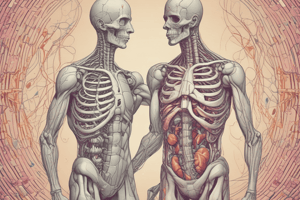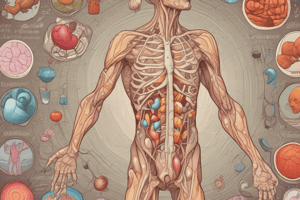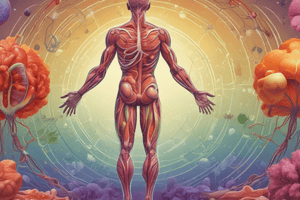Podcast
Questions and Answers
What is one of the main functions of water in the human body?
What is one of the main functions of water in the human body?
- To reduce metabolic rate
- To dissolve and transport substances needed by cells (correct)
- To increase blood pressure
- To act as a coolant for the brain
What happens when the blood becomes concentrated?
What happens when the blood becomes concentrated?
- The pituitary gland stops producing regulatory substances
- The hypothalamus responds to signals from the kidneys
- The salivary glands produce more saliva
- Water is drawn out of the salivary glands, causing dry mouth (correct)
What is the term for the balance between water intake and water excretion in the body?
What is the term for the balance between water intake and water excretion in the body?
- Fluid homeostasis
- Water balance (correct)
- Hydration balance
- Water equilibrium
What is the role of the hypothalamus in regulating water intake?
What is the role of the hypothalamus in regulating water intake?
What happens to the body's water content when a person eats a meal high in salt?
What happens to the body's water content when a person eats a meal high in salt?
What is the function of the kidneys in regulating water balance?
What is the function of the kidneys in regulating water balance?
What is the relationship between water weight and fat weight?
What is the relationship between water weight and fat weight?
What is one of the roles of water as a lubricant and cushion in the body?
What is one of the roles of water as a lubricant and cushion in the body?
What is the primary concern when exercising in hot weather?
What is the primary concern when exercising in hot weather?
What type of water has high concentrations of calcium and magnesium?
What type of water has high concentrations of calcium and magnesium?
What is the primary benefit of chlorination in public water treatment?
What is the primary benefit of chlorination in public water treatment?
Which type of water is most prone to contamination?
Which type of water is most prone to contamination?
What is a benefit of using ozone for disinfecting bottled water?
What is a benefit of using ozone for disinfecting bottled water?
What happens when mineral salts dissolve in body fluids?
What happens when mineral salts dissolve in body fluids?
How do cells regulate water movement?
How do cells regulate water movement?
What is the primary reason why water flows towards a certain direction in the body?
What is the primary reason why water flows towards a certain direction in the body?
What is the primary concern regarding iron fortification of foods?
What is the primary concern regarding iron fortification of foods?
Why do vegetarians require higher iron intake?
Why do vegetarians require higher iron intake?
What is a common symptom of zinc deficiency?
What is a common symptom of zinc deficiency?
What is a potential consequence of high zinc intake?
What is a potential consequence of high zinc intake?
What is the primary function of selenium in the body?
What is the primary function of selenium in the body?
What is a symptom of excessive fluoride intake?
What is a symptom of excessive fluoride intake?
What is the primary role of fluoride in the body?
What is the primary role of fluoride in the body?
What is the recommended approach to meeting iron needs?
What is the recommended approach to meeting iron needs?
Which group is at risk of zinc deficiency?
Which group is at risk of zinc deficiency?
What is the effect of high iron intake on zinc absorption?
What is the effect of high iron intake on zinc absorption?
What is a risk factor for osteoporosis related to nutrition?
What is a risk factor for osteoporosis related to nutrition?
What percentage of calcium is stored in bones and teeth?
What percentage of calcium is stored in bones and teeth?
What is the primary method used to diagnose osteoporosis?
What is the primary method used to diagnose osteoporosis?
What is the primary function of calcium in bone formation?
What is the primary function of calcium in bone formation?
What is a potential consequence of estrogen deficiency in women?
What is a potential consequence of estrogen deficiency in women?
What is the role of calcium in the body's fluids?
What is the role of calcium in the body's fluids?
What is a lifestyle factor that can contribute to osteoporosis?
What is a lifestyle factor that can contribute to osteoporosis?
What is the composition of dentin?
What is the composition of dentin?
What is a potential treatment for osteoporosis?
What is a potential treatment for osteoporosis?
What is the effect of fluoride on enamel?
What is the effect of fluoride on enamel?
What is the role of calcium in the clotting of blood?
What is the role of calcium in the clotting of blood?
What is a potential environmental factor that can contribute to osteoporosis?
What is a potential environmental factor that can contribute to osteoporosis?
What is the relationship between calcium and phosphorus in bone formation?
What is the relationship between calcium and phosphorus in bone formation?
What is the role of calcium in nerve transmission?
What is the role of calcium in nerve transmission?
Flashcards are hidden until you start studying
Study Notes
Water in the Body
- Water is the most indispensable nutrient, dissolving and carrying nutrients, minerals, and oxygen to cells
- Functions as a:
- Solvent for transporting nutrients, minerals, and oxygen to cells
- Cleansing agent for removing waste products from the body
- Lubricant and cushion for joints and sensitive tissues
- Coolant for regulating body temperature through evaporation
Body's Water Balance
- The body maintains a balance between water intake and excretion to keep its water content constant
- Imbalances can occur, but the body can manage them promptly
- The body controls both intake and excretion to maintain water equilibrium
- Water weight can change overnight, and it's different from fat weight
Quenching Thirst and Balancing Losses
- Thirst is regulated by the hypothalamus, which responds to concentrated blood particles, low cell fluid volume, or low blood pressure
- The hypothalamus initiates nerve impulses to the brain, causing thirst
- The brain regulates water intake, while the brain and kidneys regulate water excretion
- Sweating increases water needs, especially during physical workouts in hot weather
Drinking Water: Types, Safety, and Sources
- Hard water has high concentrations of calcium and magnesium
- Soft water has high sodium, dissolves cadmium and lead from pipes, and may aggravate hypertension
- Public water is treated to remove hazards, and testing and reporting are required
- Chlorination has benefits, but also has cancer-related risks
Body Fluids and Minerals
- Major minerals form salts that dissolve in body fluids
- Ions dissolved in water carry electrical current and are called electrolytes
- Water follows salt, and cells regulate water movement by pumping minerals across their membranes
Calcium in the Body
- Calcium is the most abundant mineral in the body, with 99% stored in bones and teeth
- Calcium has two important roles: integral part of bone structure and serving as a bank for releasing calcium to body fluids
- Calcium in body fluids regulates the transport of ions across cell membranes and is essential for nerve transmission, muscle contraction, and blood clotting
Iron in the Body
- Iron is essential for transporting oxygen in the blood
- Iron deficiency is rare in adult men, but vegetarians may need 1.8 times the normal requirement
- Iron from supplements is less well-absorbed than iron from food
- Excessive iron intake can be toxic and lead to oxidative stress
Zinc in the Body
- Zinc occurs in small quantities in the body and works with proteins to:
- Protect cell structures against damage from oxidation
- Make parts of cell genetic material
- Make heme in hemoglobin
- Zinc is essential for pancreatic functions, insulin functions, and metabolizing carbohydrates, proteins, and fats
- Zinc deficiency can impair immunity, taste, and vision, especially in pregnant women, young children, the elderly, and the poor
Selenium in the Body
- Selenium protects vulnerable body molecules against oxidative destruction
- Selenium plays a role in activating thyroid hormone and correlates with cancer prevention
- Deficiency is rare with a varied diet
- Toxicity is possible with supplements, causing hair loss, brittle nails, and other issues
Fluoride in the Body
- Fluoride is not essential but plays a role in forming decay-resistant fluorapatite in developing teeth
- Deficiency leads to dental caries
- Excess fluoride can cause fluorosis, discoloring teeth and weakening bones
Osteoporosis
- Causes include gender, advanced age, genetics, and environmental factors (poor nutrition, estrogen deficiency, lack of physical activity, and excess protein, sodium, caffeine, and soft drinks)
- Diagnosis involves bone density measurement, and treatment includes drugs that can reverse bone loss
Studying That Suits You
Use AI to generate personalized quizzes and flashcards to suit your learning preferences.



